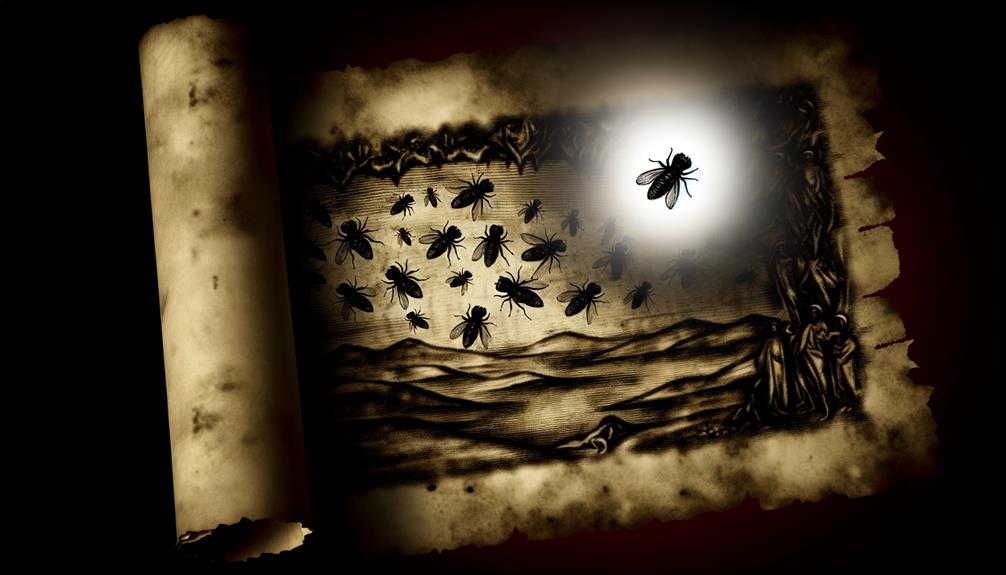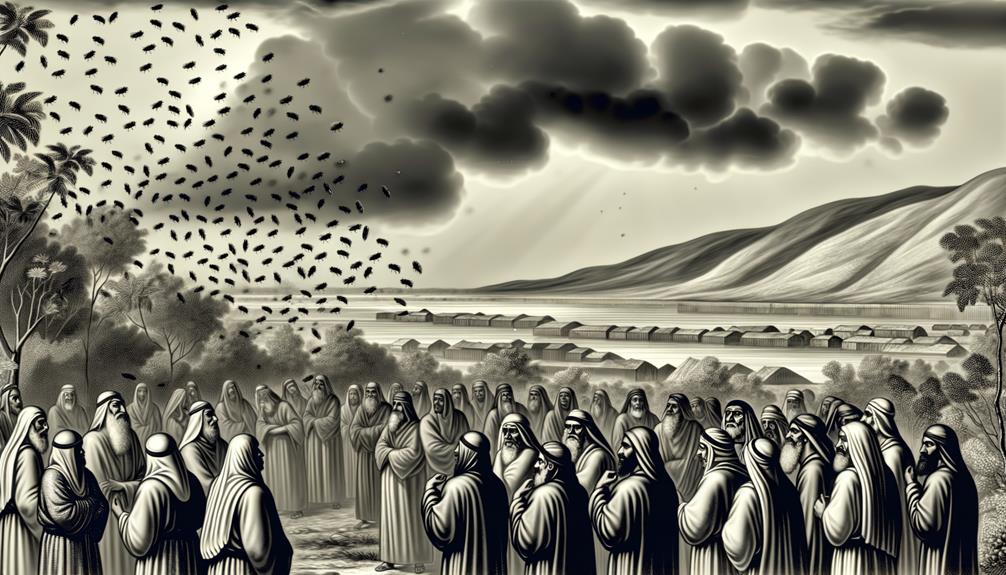Spiritual Meaning of Flies in the Bible: Judgment and Decay
In the Bible, flies symbolize spiritual defilement, moral decay, and divine judgment. You see this in Exodus 8:21, where the plague of flies showcases God’s power and judgment against Pharaoh.
Flies also represent small actions leading to significant corruption, as seen in Ecclesiastes 10:1. These insects are used to illustrate spiritual neglect and the pervasiveness of sin, emphasizing the need for continual moral vigilance.
Isaiah 7:18 further connects flies to divine punishment for disobedience. By understanding these symbols, you can gain deeper insights into maintaining spiritual purity and recognizing the consequences of moral complacency.

Spiritual Meaning of Flies in the Bible: Judgment, Corruption, and Spiritual Wake-Up Call
| Symbolism Aspect | Biblical Meaning |
|---|---|
| Flies in Exodus | Used as a plague in Egypt—symbol of divine warning and judgment (Exodus 8:20-32) |
| Association with Decay | Flies represent corruption, sin, and the consequences of spiritual neglect |
| Beelzebub (Lord of Flies) | In the New Testament, symbolizes demonic forces or opposition to divine order |
| Wake-Up Call | A sign to examine one’s heart, repent, and seek spiritual purification |
| Spiritual Message | Flies serve as a call to confront impurity and restore alignment with God’s will |
Biblical References to Flies

The Bible mentions flies in several key passages, often symbolizing uncleanliness and divine judgment.
In Exodus 8:21, you’ll find the plague of flies inflicted upon Egypt, illustrating God’s power and Pharaoh’s stubbornness. This event isn’t just about physical discomfort; it signifies a deeper spiritual defilement.
Isaiah 7:18 references flies from Egypt as instruments of God’s punishment, emphasizing the divine orchestration behind these seemingly mundane creatures.
Additionally, Ecclesiastes 10:1 uses flies to illustrate how small misdeeds can corrupt greater virtues.
Symbolism of Decay
When you encounter flies in biblical texts, they often symbolize decay, representing not just physical deterioration but moral corruption. This imagery underscores the consequences of spiritual neglect and ethical lapses.
You can interpret the presence of flies as a stark reminder of the importance of maintaining spiritual and moral vigilance.
Representing Moral Corruption
Why do flies, often seen hovering around decaying matter, serve as a potent biblical metaphor for moral corruption and spiritual decay?
In the Bible, flies symbolize the pervasiveness of sin and the contamination of the soul. Just as flies are drawn to rot, moral corruption attracts further depravity, creating a cycle of spiritual decline.
You can see this in Ecclesiastes 10:1, where ‘dead flies’ spoil the perfumer’s ointment, illustrating how small acts of corruption can taint one’s entire character. This imagery underscores the insidious nature of sin, emphasizing how neglecting moral vigilance leads to spiritual decay.
Consequently, flies serve as a stark reminder of the importance of maintaining purity and resisting moral corruption in your spiritual journey.
Indicating Spiritual Neglect
Flies in biblical texts often symbolize spiritual neglect, highlighting how unattended spiritual practices can lead to moral and spiritual decay. When you ignore your spiritual life, it’s akin to leaving food out to rot, attracting flies. This neglect invites negative influences and weakens your moral foundation.
Scripture uses flies to illustrate that spiritual decay doesn’t happen overnight; it’s a gradual process that starts with small acts of neglect. By examining these passages, you can see the importance of maintaining your spiritual health.
Regular prayer, worship, and moral vigilance are essential to prevent the decay symbolized by flies. Understanding this symbolism helps you recognize the dangers of spiritual complacency and encourages you to actively nurture your faith.
Representations of Impurity

In several biblical passages, flies symbolize impurity and moral decay, serving as a vivid representation of sin and corruption.
Flies’ relentless presence around decay and filth evokes unsettling emotions, drawing a stark parallel to the pervasive nature of sin. As you reflect on these symbols, consider the emotional and spiritual impact:
| Emotion | Symbolism | Biblical Reference |
|---|---|---|
| Disgust | Moral Decay | Ecclesiastes 10:1 |
| Unease | Pervasive Sin | Exodus 8:21-24 |
| Revulsion | Corruption | Isaiah 7:18-19 |
These references highlight how impurity can infiltrate life, much like flies infiltrate clean spaces. Understanding these symbols encourages deeper reflection on purity and righteousness, urging you to confront and cleanse moral impurities.
Flies as Divine Judgment
Throughout the Bible, the presence of flies often serves as a manifestation of divine judgment, symbolizing God’s response to human disobedience and sin.
In Exodus 8:21-24, the plague of flies afflicts Egypt, illustrating God’s power and the consequences of Pharaoh’s hardened heart. This event underscores the severity of divine retribution when humanity strays from righteousness.
Similarly, in Isaiah 7:18, flies are summoned as instruments of punishment against a rebellious nation.
These passages emphasize that flies aren’t merely pests but divine agents used to enforce moral and spiritual laws.
Lessons From Plagues

Reflecting on the biblical plagues, you’ll find profound lessons about obedience, divine authority, and the consequences of moral failure. The plagues, including those involving flies, reveal the serious repercussions of defying God’s commands.
When Pharaoh ignored Moses’ warnings, the plagues served as stark reminders of divine power and justice. This narrative illustrates that disobedience leads to suffering, not just for individuals but for entire communities.
By examining these events, you can understand that divine directives shouldn’t be taken lightly. The flies, as agents of discomfort and disease, symbolize the tangible manifestation of divine displeasure.
These stories compel you to contemplate the importance of aligning your actions with moral and spiritual principles to avoid similar fates.
Theological Interpretations
Theological interpretations of flies in the Bible often explore their symbolic representation of spiritual corruption and moral decay.
You’ll find that flies, appearing in various biblical passages, frequently signify the presence of sin and divine displeasure. These interpretations draw from scriptural context and theological analysis.
| Symbol | Biblical Reference | Interpretation |
|---|---|---|
| Flies | Exodus 8:21-31 | Plague, divine judgment |
| Flies | Ecclesiastes 10:1 | Spoilage, folly in wisdom |
| Flies | Isaiah 7:18 | Summoning of enemies |
| Flies | Matthew 23:24 | Hypocrisy, minor faults |
| Flies | Revelation 16:10-11 | Darkness, suffering |
Modern Spiritual Insights

Delving into modern spiritual insights, you’ll find that flies continue to symbolize various forms of spiritual and moral challenges, reflecting contemporary struggles with inner darkness and ethical lapses.
In today’s context, flies can represent the nagging thoughts and persistent negative emotions that disrupt inner peace. They may also illustrate how minor ethical compromises can lead to larger moral decay.
By examining these pestilent creatures, you can better understand the importance of vigilance in your spiritual journey. Recognizing the symbolism of flies helps you identify and address the small, often overlooked issues that can accumulate and lead to significant spiritual consequences.
Consequently, flies serve as reminders to maintain moral integrity and spiritual cleanliness in a complex, modern world.
Conclusion
In fundamental terms, flies in the Bible buzz with layers of meaning, from decay and impurity to divine judgment. They serve as symbols, whispering lessons from ancient plagues and theological insights.
As you explore deeper, you’ll find that these tiny creatures carry weighty spiritual significance, reflecting humanity’s struggles with sin and redemption. Embrace these modern spiritual insights, and let them illuminate your path like a beacon amid the darkness of misunderstanding.






